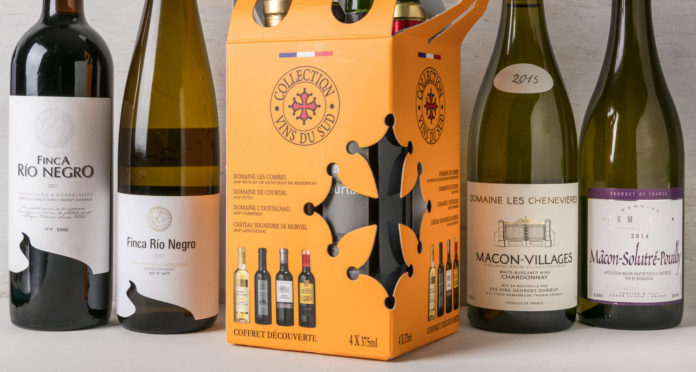The label for La Moneda Malbec Reserva 2015 from Chile looks like nothing special, until you notice the small decal on the side touting 95 points and a platinum medal from Decanter magazine. Even if you don’t know that Decanter is Britain’s leading wine journal, 95 points is an impressive score for any wine, especially a cheap one. Last June, when it won best single-variety red costing under 15 pounds (about $18.75) in Decanter’s annual World Wine Awards, consumer demand crashed the website of Asda supermarkets, La Moneda’s exclusive retail outlet. Demand spiked so high that Asda’s parent company, Walmart, decided to sell the wine in the United States.
So last fall, Walmart introduced the La Moneda Malbec into 577 of its 4,600 or so U.S. stores, priced at $6.96 a bottle. Having tasted a sample, I can tell you it is really good, and it was still delicious and lively three or four days after opening, my unscientific way of assessing wine quality.
Unfortunately, it is not available in Washington-area Walmart stores – or possibly in any Walmart. A company spokesman says the initial U.S. allotment “sold through” over the holidays. Furthermore, it’s unclear whether U.S. customers will ever be able to buy La Moneda. The supplier is already selling Walmart the 2016 vintage, but only for the U.K. market, and the spokesman would say only that the company is always looking for “new opportunities” to offer similar values to its American customers.
Nevertheless, the La Moneda story gives us a glimpse into how many good, inexpensive wines reach the shelves of chain stores such as Walmart, Costco, Total Wine & More and BevMo.
It’s not the romantic tale of artisan vintners lovingly coddling their expensive oak barrels to produce a few hundred cases of mind-blowing vino. Most wine is an industrial agricultural product, made at large wineries sometimes derisively called “tank farms” for the huge stainless-steel tanks that hold thousands of gallons waiting to be bottled on demand. Economy of scale helps make wine inexpensive enough to be our daily tipple. Exclusive private-label wines are one way retailers vie for a competitive edge.
The La Moneda malbec is one of 60 such “distinctive labels” Walmart sells, including $3 table wines and more premium proseccos and other bubblies, according to Kurt Carlson, a wine buyer with Walmart’s adult beverage team. Walmart leverages its corporate buying power to partner with large wineries around the world and with importers and distributors here in the United States. Exclusivity is not so much a legal arrangement as a fact of life.
“Any retailer can ask a distributor for some La Moneda,” Carlson told me in a telephone interview from Walmart headquarters in Arkansas. “But the truth is, we’ve already bought it all.” He declined to say exactly how much of the malbec Walmart has acquired.
The label says La Moneda is produced by Ranco Wines, bottled by Viña Luis Felipe Edwards Nancagua in Chile, and imported by Prestige Wine & Spirits Group in Princeton, Minn. Ranco’s general manager, Raimundo Valenzuela, told me in an email exchange that the wine was made by RR Bulk Wine, Ranco’s main company, founded in 1993. Valenzuela described RR as Chile’s largest wine exporter, with about 2,500 acres of vineyards, shipping more than 80 million liters a year to more than 25 countries. That’s a whopping 107 million bottles, or nearly 9 million cases. Ranco sells mainly to European supermarket chains and large U.S. companies with numerous brands, such as the Wine Group, Constellation, and E&J Gallo, he said.
The wine that wowed Decanter’s tasters was shipped in bulk to Britain and bottled there, which helps reduce costs, Valenzuela said. For the U.S. market, Ranco enlisted Viña Luis Felipe Edwards to bottle the wine in Chile. And the importer? According to the certificate of label approval filed with the U.S. Treasury Department’s Alcohol and Tobacco Tax and Trade Bureau, Prestige Wine & Spirits Group is United States Distilled Products, one of the nation’s largest producers of private-label liquors.
So here’s the story of La Moneda (and similar private-label wines): Ranco produces a lot of wine inexpensively. Carlson and other buyers from Walmart taste the malbec. Recognizing its quality, they use Walmart’s market power to buy all of it at a good price. They could call it anything – Chateau This or Domaine That, even though there is no such idyllic property associated with the wine. (La Moneda is Spanish for “the coin,” appropriately enough.) They bring it into the United States through their importer to various distributors, who speed the product through the three-tier distribution network at minimal cost. Because the wine is going exclusively to one store’s various outlets, there’s no marketing cost to build the brand and fight for shelf space. (Though someone at Walmart was smart enough to enter the malbec into the Decanter competition and then market its triumph for all it was worth.)
Once in the store, the wine receives prime placement on the shelf – at eye level, or a coveted end-of-aisle display – alongside California chardonnays and merlots that also don’t have the store name on the label but are available nowhere else. National brands are often relegated to less-visible, harder-to-reach shelves. That preference for the store-owned product sometimes leads distributors to chafe about an unfair disadvantage for their own brands.
For consumers, of course, what matters is the wine, not the label. And we don’t want to have to rummage around looking for the La Moneda Malbec.
—
McIntyre blogs at dmwineline.com. On Twitter: @dmwine.






